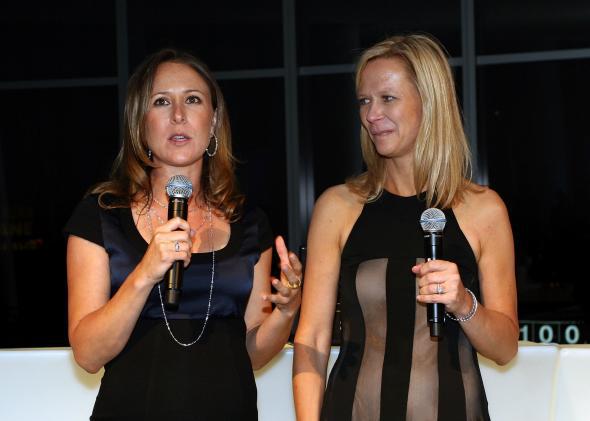The letter that the FDA sent to 23andMe today, asking the company to stop selling its personal genetic testing kits, shouldn’t be that surprising. It is just the next act in a narrative that will have to work itself out over the coming decade.
23andMe’s website says it offers “genetic testing for health, disease & ancestry.” For $99, you can “get to know you” with “reports on 240+ health conditions and traits,” among other things. 23andMe has filed applications with the FDA for portions of its testing, and it has apparently had repeated contact with the FDA. But the agency says that the company is marketing its kit as a medical device and thus requires approval: “[E]ven after … many interactions with 23andMe, we still do not have any assurance that the firm has analytically or clinically validated the [personal genomic service] for its intended uses.” The agency warns that customers could make the wrong medical decisions after receiving a 23andMe report about their genomes.
In response, 23andMe released a statement to TechCrunch saying, “We recognize that we have not met the FDA’s expectations regarding timeline and communication regarding our submission. Our relationship with the FDA is extremely important to us and we are committed to fully engaging with them to address their concerns.”
You can frame this as an “old economy” vs. “new economy” clash. Medical testing firms are well-established sectors of the American economy, and they expect relatively tight regulatory oversight because of the nature of what they are selling. Tech companies, in contrast, are governed with a looser hand, and they sink or swim without much oversight in their first years. Based out of Silicon Valley (not to mention co-founded by Anne Wojcicki, the reportedly estranged wife of Google’s Sergey Brin), 23andMe has the blood of a tech company coursing through its veins, but it’s entering a domain which has traditionally been governed by numerous regulations.
23andMe has to navigate a very narrow path. A few months ago I saw Spencer Wells, a geneticist at National Geographic, speak at the Consumer Genetics Conference. He made a simple case for why NatGeo avoided going into medical assessment: Asserting that you can provide actionable medical results, as 23andMe has done in its marketing over the past year, is going to trigger a move by the regulatory bodies that govern these areas. Responding in your defense that these results are “recreational,” to sidestep governance and mitigate scrutiny, undermines the business model, which is designed to appeal to consumers looking for serious health information. The consequences of mistakes by 23andMe can be deadly serious. If it reports a “false positive” for a major disease, that can alter someone’s whole life (though I’m rather sure that any medical professional would obtain results from another service to confirm positive results).
But reading through the discussion boards of 23andMe’s community forums one thing you also notice is the literal avalanche of “false negatives,” where people with a disease express irritation that 23andMe’s prediction algorithms infer low risk. Though 23andMe has links to the scientific literature which make the statistical arguments clear, obviously many of their customers don’t bother to acquaint themselves with the nuances and react emotionally to confusing results.
This brings us to the fact that 23andMe is just part of a broader movement toward the democratization of health information. This incident highlights the tension between the paternalistic medical establishment that arose to deal with the dangers of 19th-century quack medicine, and a “techno-populist” element of American society pioneering personal health assessment and decision-making by leveraging new information technologies. Caught between them is the general public, which trusts institutions but is obviously intrigued by the offerings of consumer medicine, as judged by units sold of 23andMe’s kits.
Genotyping whole genome sequencing services are soon going to be as ubiquitous as white bread. The likelihood that the FDA would ban you from reading your raw results seems low. Rather, their concern is when a firm like 23andMe interprets those results. The glaring weakness in an aggressive strategy against interpretative services is that there will always be firms such as 23andMe, and there’s no reason that they need to be based out of the United States. Not only that, but there are open-source desktop applications, such as Promethease, that provide many of the same results by combining individual raw data with public peer-reviewed literature, if less slickly than 23andMe. To truly eliminate the public health threat that the FDA is concerned about, the U.S. government would have to constrict and regulate the whole information ecology, not just a strategic portion of it, from scientists distributing research about genetic variants, to international genome sequencing firms returning raw results on the cheap.
In hindsight I suspect that the FDA targeting 23andMe is going to seem rather like the RIAA shutting down Napster. The data is coming. The institutions designed to protect the public from fraud need to think more about empowerment rather than engaging in fiat paternalism.
*Correction, Nov. 25, 2013: Due to a photo provider error, a photo caption originally misspelled the last name of 23andMe co-founder Linda Avey.
